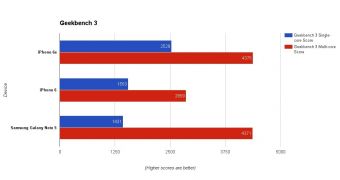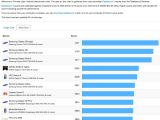According to Geekbench results, Apple's new iPhone 6s absolutely destroys all Android smartphones in single-core benchmarks, and as Geekbench's developer stated in a tweet yesterday, it actually is on par with Apple's entry level 2015 MacBook.
Furthermore, to make things even worse (or better if you've just bought an iPhone 6s), Apple's newest dual-core iPhone also beats Android-based devices in multi-core benchmark results, with the only exception being Samsung's octa-core S6 edge, which racks in 4401 points while the iPhone 6s only gets 4375, as measured by MobileSyrup.
Fact is that even if the iPhone 6s wouldn't have been able to obliterate all these Android devices in benchmarks, and its results would have placed it in the top ten or twenty devices, this is still a statement of the difference in performance per core when comparing Apple's A9 dual-core chipset with the quad- and octa-core chipsets available in most Android devices these days.
This puts Apple's chipset design team at the top of the food chain in the smartphone market, and consequently, makes all A9-powered devices that Apple will launch in the future the first picks for users that want the best performance.
The Geekbench benchmark results for the iPhone 6s come as a surprise given that the 32% speed difference between Apple's A8 and A9 chipsets actually translates into a 53% boost in multi-core and a 63% increase in single-core scores.
Adding 2 GB of RAM in the iPhone 6s is Apple's best move since the release of large-screen iPhones
This increase in performance is probably a direct result of Apple's decision to add 2 GB of RAM in the iPhone 6s, which might have removed a performance bottleneck due to the incapacity of the 1 GB of RAM available in previous iPhone models to keep up with the chipset's speed (it would be interesting to see the Geekbench scores of an iPhone 6 with 2 GB or RAM).
However, even if spectacular for a dual-core processor, these benchmark results will most probably be seen as laughable if the rumor saying that Apple might be working on a hexa-core A10 chipset proves to be true.
An A10 SoC with six cores coupled with a sustained performance per core ratio would probably be the ultimate nightmare for an Android manufacturer that can't even keep up with the dual-core A9 using a octa-core chipset.

 14 DAY TRIAL //
14 DAY TRIAL // 
